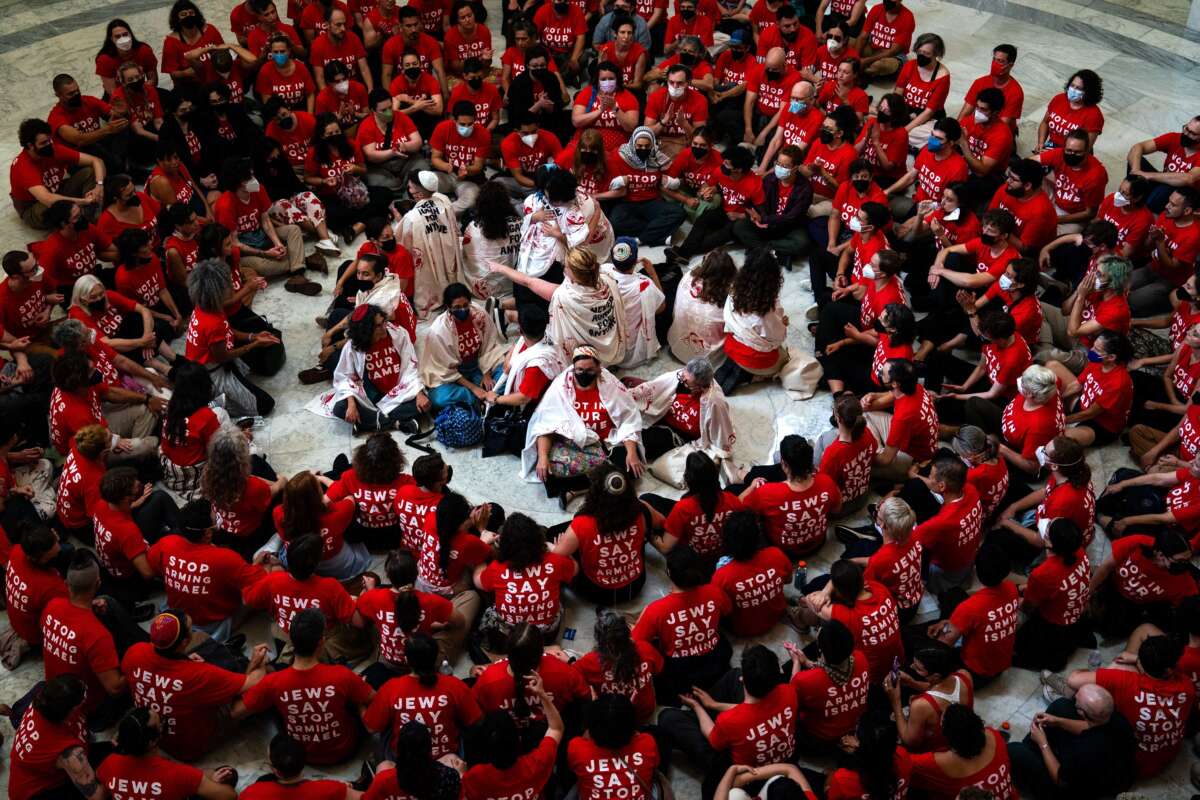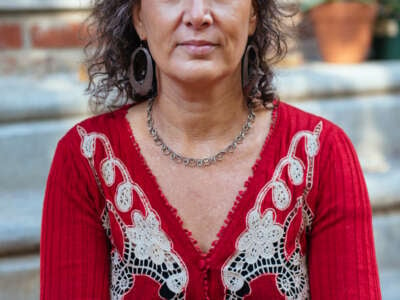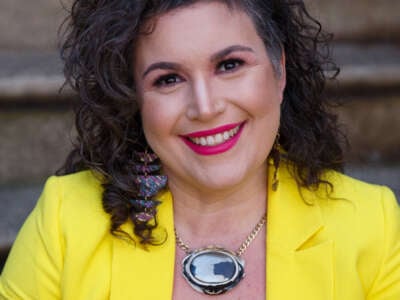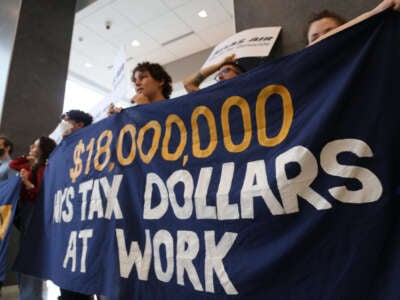Jewish anti-Zionists share insights on our collective struggle to build a strong left in the face of looming disaster.
By Rebecca Vilkomerson & Alissa Wise ,
September 3, 2024

Jewish Voice for Peace protesters demonstrate in the Cannon House Office Building rotunda on Capitol Hill on July 23, 2024, in Washington, D.C.
Kent Nishimura / Getty Images
Left movements are engaged in some of the hardest work there is — politically, emotionally and spiritually — because it involves changing peoples’ perceptions of the world, fighting against a status quo that is accepted as a given. That is true for abolitionists, for queer and trans people fighting for their rights, for the Land Back movement, and for all those fighting against capitalism. It is also true of anti-Zionist Jews organizing for Palestinian freedom, as we have for over two decades.
This work often requires challenging your own communities, engaging with and moving through painful feelings, and building a vision of a new world — tasks that can be very lonely for a long time. That has been the reality of our work too, and we have tried to share it in all its complexity, pain, beauty and strategic utility in our new book, Solidarity is the Political Version of Love: Lessons from Jewish Anti-Zionist Organizing, about our years in staff leadership at Jewish Voice for Peace (JVP).
Over the last few years, Alissa did some work with Hindus for Human Rights as they were consciously building out an organization that would use the structures and orientation of JVP as a model for their own work. Similarly, as Rebecca joined the board of Showing Up for Racial Justice (SURJ), the strengths and challenges of organizing white communities against fascism and for a multiracial democracy rang deeply familiar to her experience at JVP. We realized that the lessons from our work at JVP are very relevant to multiple communities, especially those that share an emphasis on collectivity and identity while fighting internal right-wing and nationalist currents at the same time.
We are in a very serious moment in U.S. political life, facing intense threats to democracy, looming climate disaster and U.S. complicity in a genocidal war against Palestinians in Gaza. We hope the lessons of building a sustainable, functioning, effective left movement in the face of difficult conditions will help activists forge the tools they need to build interlocking, durable left movements that can thrive despite today’s challenges.
We collected these lessons into a book precisely so organizers would be ready to meet a moment as unfathomable and painful as we are witnessing and fighting to end in Gaza, in the U.S., and around the world. We hope the book can be a tool for organizers, veteran and new, as we struggle forward toward the transformation we know is possible even in moments like these. The book offers several key lessons that we think can help us realize that potential.
This work often requires challenging your own communities, engaging with and moving through painful feelings, and building a vision of a new world — tasks that can be very lonely for a long time. That has been the reality of our work too, and we have tried to share it in all its complexity, pain, beauty and strategic utility in our new book, Solidarity is the Political Version of Love: Lessons from Jewish Anti-Zionist Organizing, about our years in staff leadership at Jewish Voice for Peace (JVP).
Over the last few years, Alissa did some work with Hindus for Human Rights as they were consciously building out an organization that would use the structures and orientation of JVP as a model for their own work. Similarly, as Rebecca joined the board of Showing Up for Racial Justice (SURJ), the strengths and challenges of organizing white communities against fascism and for a multiracial democracy rang deeply familiar to her experience at JVP. We realized that the lessons from our work at JVP are very relevant to multiple communities, especially those that share an emphasis on collectivity and identity while fighting internal right-wing and nationalist currents at the same time.
We are in a very serious moment in U.S. political life, facing intense threats to democracy, looming climate disaster and U.S. complicity in a genocidal war against Palestinians in Gaza. We hope the lessons of building a sustainable, functioning, effective left movement in the face of difficult conditions will help activists forge the tools they need to build interlocking, durable left movements that can thrive despite today’s challenges.
We collected these lessons into a book precisely so organizers would be ready to meet a moment as unfathomable and painful as we are witnessing and fighting to end in Gaza, in the U.S., and around the world. We hope the book can be a tool for organizers, veteran and new, as we struggle forward toward the transformation we know is possible even in moments like these. The book offers several key lessons that we think can help us realize that potential.
News |As the US government continues to arm the Israeli military, activists aim to disrupt the war machine’s supply chain.By Arvind Dilawar , TruthoutAugust 30, 2024
The importance of building a political home. People often show up to organize because they are agitated, hurt, isolated or furious. They need a space to counter those feelings, find and appropriately deploy their power, and cultivate radical hope. Above all, to have staying power, movements need to be places where we find and build community, where we can bring our full selves, and where we can learn and reflect together. It is sometimes difficult to recognize the enormous value of simply keeping a movement together by building a nurturing political home.
You can sharpen your politics as you grow. During our tenure at JVP, the organization made two crucial decisions: to endorse the boycott, divestment and sanctions (BDS) movement, and to become an anti-Zionist organization. This required intensive, deliberative and inclusive internal processes, a fair amount of nerve, and a commitment not to get stuck in our own status quo. Rather than limiting our unity and reach, those decisions to take on more radical positions brought expanded support, membership and buy-in.
People with power and privilege can be effective in shifting narratives and contributing to movement building, but also need to be attentive to relative power in those broader movements. For those of us upstream in terms of power, we are obligated to leverage our access strategically, while also holding the responsibility to use our privilege to make space for others, and then know when to get out of the way once that space is made. As white Jewish organizers, we want to hold and show the complexity of making mistakes and yet still be worthwhile and impactful as part of a larger ecosystem.
Strategies and tactics should change as your relative power changes. Before JVP launched a 501(c)(4) sister organization, JVP was steadily building power outside of D.C. in order to build power in D.C. JVP needed to have enough people before we knew we could be serious players in shifting who is in Congress and what comes out of Congress. The strategies used as an organization of a few thousand became insufficient for an organization of tens of thousands. The power a movement holds is never static, and must be deployed deftly to retain its influence.
We turned in the final draft of our book in September 2023. At the time, we couldn’t have imagined the horror of the genocide that was about to unfold. It remains soul-rending that the genocide continues almost a year later. We hope the organizing lessons in this book will prove to be a helpful tool to build our collective strength and resistance for the long haul as we all continue to organize toward life and liberation for Palestine and us all.
Join us in defending the truth before it’s too late
The future of journalism is uncertain, and the consequences of losing it are too grave to ignore. To ensure Truthout remains fearless, tough, and 100 percent independent, we rely on reader support. Every dollar you donate goes directly toward the costs of producing news you can trust.
Please give what you can — because by supporting us with a tax-deductible donation, you’re not just preserving a source of news, you’re helping to safeguard what’s left of our democracy.
This article is licensed under Creative Commons (CC BY-NC-ND 4.0), and you are free to share and republish under the terms of the license. See further guidelines here.

Rebecca Vilkomerson
Rebecca Vilkomerson was the executive director of Jewish Voice for Peace (JVP) from 2009-2019. She is now the co-director of Funding Freedom, organizing within philanthropy to support Palestinian liberation. She is a member leader of JVP-NY.

Alissa Wise
Rabbi Alissa Wise is a community organizer, educator, organizational consultant and ritual leader with over two decades of movement-building experience. Rabbi Wise co-founded the JVP Rabbinical Council in 2010, and was a staff leader at Jewish Voice for Peace (JVP) from 2011-2021. She is currently the lead organizer of Rabbis for Ceasefire, which she founded in October 2023.

No comments:
Post a Comment